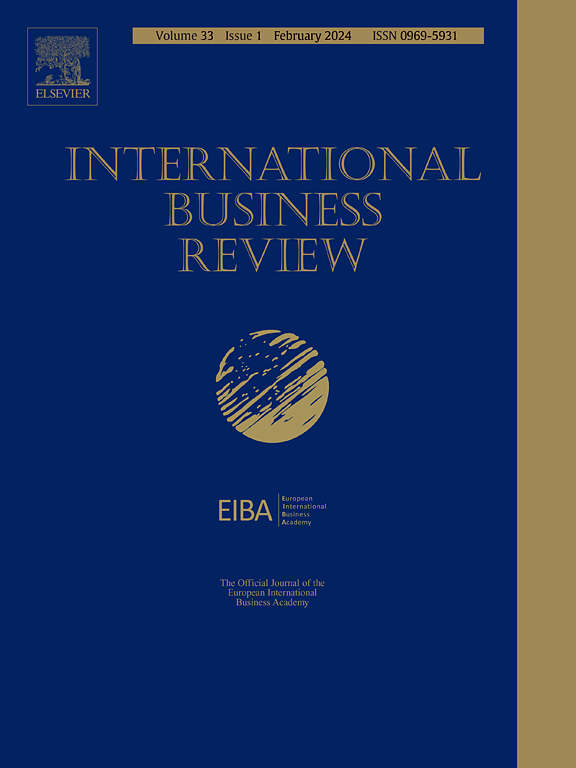Is bottom-of-the-pyramid orientation a new reason for product imitation in emerging markets?
IF 6.1
1区 管理学
Q1 BUSINESS
引用次数: 0
Abstract
While international business studies suggest that multinationals conduct extensive market research and innovation tailored to bottom-of-the-pyramid (BOP) customer demand, the inherent challenges of the BOP market remain overlooked. This study highlights the role of product imitation in tackling the challenges of cost reduction and awareness improvement. The imitation literature focuses on the role of institutional environments in preventing product imitation in emerging markets, while little attention is paid to how customers—especially BOP customers, the dominant arbiters of value in emerging economies—motivate firms to engage in product imitation. Drawing on institutional theory and the demand-side view, this study examines the relationship between BOP orientation—the orientation toward meeting the unique demands of BOP customers—and product imitation. Using survey data from 334 Chinese manufacturing firms, this study finds that BOP orientation has a positive relationship with product imitation. Legal incompleteness and demand uncertainty strengthen this relationship, while demand heterogeneity weakens it. This study contributes to the literature by identifying BOP orientation as an important demand-side antecedent of product imitation and highlighting how these effects are contingent on institutional and demand factors.
金字塔底导向是新兴市场中产品模仿的新原因吗?
尽管国际商业研究表明,跨国公司针对金字塔底部(BOP)客户的需求进行了广泛的市场研究和创新,但BOP市场的内在挑战仍被忽视。本研究强调了产品模仿在降低成本和提高意识方面的作用。模仿文献关注的是制度环境在防止新兴市场产品模仿方面的作用,而很少关注消费者——尤其是新兴经济体中占主导地位的价值仲裁者——BOP消费者——如何激励企业从事产品模仿。利用制度理论和需求侧观点,本研究考察了防喷器导向(以满足防喷器客户独特需求为导向)与产品模仿之间的关系。通过对334家中国制造企业的调查数据,本研究发现BOP取向与产品模仿之间存在正相关关系。法律的不完备性和需求的不确定性加强了这种关系,而需求的异质性则削弱了这种关系。本研究通过将防喷器导向确定为产品模仿的重要需求侧先决条件,并强调这些影响如何取决于制度和需求因素,从而为文献做出了贡献。
本文章由计算机程序翻译,如有差异,请以英文原文为准。
求助全文
约1分钟内获得全文
求助全文
来源期刊

International Business Review
BUSINESS-
CiteScore
14.10
自引率
6.90%
发文量
95
审稿时长
62 days
期刊介绍:
The International Business Review (IBR) stands as a premier international journal within the realm of international business and proudly serves as the official publication of the European International Business Academy (EIBA). This esteemed journal publishes original and insightful papers addressing the theory and practice of international business, encompassing a broad spectrum of topics such as firms' internationalization strategies, cross-border management of operations, and comparative studies of business environments across different countries. In essence, IBR is dedicated to disseminating research that informs the international operations of firms, whether they are SMEs or large MNEs, and guides the actions of policymakers in both home and host countries. The journal warmly welcomes conceptual papers, empirical studies, and review articles, fostering contributions from various disciplines including strategy, finance, management, marketing, economics, HRM, and organizational studies. IBR embraces methodological diversity, with equal openness to papers utilizing quantitative, qualitative, or mixed-method approaches.
 求助内容:
求助内容: 应助结果提醒方式:
应助结果提醒方式:


